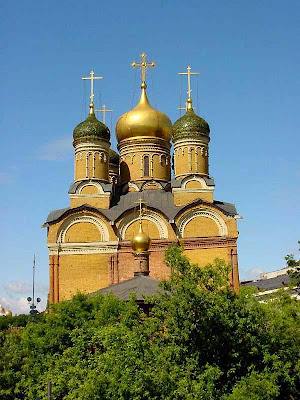Antiochian Orthodox Church. 4828 - 216 A St. Langley, BC, V3A 2N5 www.holynativitychurch.ca
Thursday, October 04, 2012
What It Means To Be the True Church
I believe in one holy catholic and apostolic church.
A reoccurring question of inquirers from an Protestant background is whether the Orthodox Church considers itself to be the only true church. The short answer is an unequivocal yes. But the longer answer requires a certain amount of explanation because what the inquirer means when he says "church" is usually not what the Church means when it refers to herself as church. Perhaps one way to get at this longer answer is to consider what Jesus had to say about the Pharisees and the Samaritans in the Gospels.
In the Gospels, the orthodox believes were certainly the Pharisees. Jesus says of them that they sit in Moses' seat and that they should be obeyed: "Do what they say," Jesus says, "but don't do what they do." Furthermore, in His conversation with the Samaritan woman, Jesus is uncompromising: "You worship what you do not know, but we worship what we know, for salvation is of the Jews." No compromise here. The Jews, and particularly the most strict, most orthodox sect of the Jews, the Pharisees, these are the ones who know what they are doing when it comes to worship, these are the ones who sit in Moses's seat, these are the ones of whom and among whom salvation is. But that doesn't at all mean that only Jews can be saved.
In fact, it is particularly the Samaritans, this group of people who "worship what they do not know," whom Jesus seems to highlight as examples of people typifying what the Kingdom of God is like. For example, of the ten leapers who are healed by Jesus, only the Samaritan among them returns to give thanks. In the Parable of the Good Samaritan, it is not the Jewish leaders, not the priest and levite, who stop and help the wounded man. Who helps the wounded man? None other than the Samaritan--the one who doesn't know what he worships. And the longest conversation of Jesus recorded in the Gospel is with a Samaritan woman, a woman of disrepute, a woman who didn't know what she worshiped, but who becomes a tireless evangelist for Christ, ultimately witnessing before Emperor Nero before her martyrdom.
In the Gospel we see that the Kingdom of God is not limited to the Jewish people ("the Wind blows where it will"). Nevertheless, "salvation is of the Jews." The law and the covenants are of the Jews. The very Word of God Himself is a Jew. The "church in the wilderness" (Acts 7:38) is the Jewish people, the true church of the Old Covenant.
How can this be? What is the Church that it should be called church? The Church, and the Orthodox Church asserts that she and only she is this Church, is the repository of the true/correct teaching and true/correct worship of God. However, everyone in the true Church is not necessarily a faithful follower of Christ. And there are faithful followers of Christ who may be separated (by historical or geographical accident) from the true Church. In fact, there may indeed be true and faithful followers of Christ who have rejected the true Church--because their only exposure to the Orthodox Church was to Orthodox Christians who were not faithful followers of Christ.
Just as Jesus said of the Pharisees, that they sit in Moses's seat, so the Orthodox Church asserts at she sits as the bearer of the holy, catholic and apostolic teaching and the faithful, true worship of Christ. Unfortunately, sometimes, it must be said of the some Orthodox Christians: "do what they say, not what they do."
The situation is comparable to the medical field. One may have a perfect understanding of the latest and best medical practices, but not follow them. That is, a highly qualified doctor may also be completely lacking in bedside manner, motivated only by greed, and often drunk. At the same time, there may be a person with only half a medical education, but motivated by love, full of empathy and attentive to the subtle bodily clues in her patients. Now in the strictest sense, only the first doctor is "qualified" to practice medicine--never mind that she seldom actually cures anyone. The second doctor--well, a quack really because she is not "qualified" to practice medicine--through her empathy and attention along with her not-quite-complete education cures almost everyone who comes to her. The Pharisee who meets Jesus in the dark, leaves in the dark. The Samaritan who doesn't quite know what she worships meets the Messiah and evangelizes her city.
The Orthodox Church is the one, holy, catholic and apostolic church. It is the field of wheat sown also with tares. It is the field in which is buried the pearl. It is the great net full of both good and bad fish. The Holy Orthodox Church is where one will find true teaching and true worship, but one will also find lots of people who are less than true, who are struggling, or who are not even trying. To say that the Holy Orthodox Church is the one true church is not to say that it is the perfect church. Neither is it to say that those outside the Orthodox Church cannot find salvation. Rather, to say that the Orthodox Church is one, holy, catholic and apostolic is to make a statement of fact, of history and of doctrine--not of soteriology.
Subscribe to:
Post Comments (Atom)

No comments:
Post a Comment